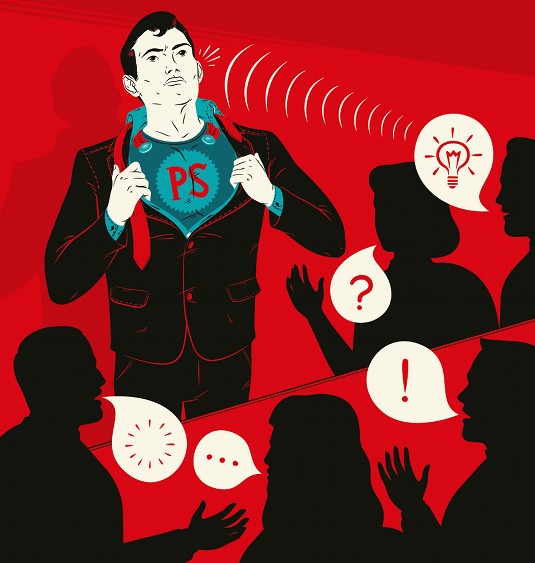How learning people skills can be like gaining a superpower
A look at how interpersonal skills can help overcome job frustration and turn conflict into collaboration.
Sign up to Creative Bloq's daily newsletter, which brings you the latest news and inspiration from the worlds of art, design and technology.
You are now subscribed
Your newsletter sign-up was successful
Want to add more newsletters?

If you struggle in your job to receive appreciation for your contributions, find time to develop your skills and find meaning in your work, it's easy to feel frustrated. In particular as a web designer or developer, these needs often aren't met when colleagues and clients are afraid of change and seem to block your contributions; managers allocate limited time for design because they have unrealistic expectations; and departments fight between each other instead of working together.
It's no wonder that many web professionals suffer from burnout and depression. Imagine what your work would be like if you could find common ground with people who seem to have different perspectives; feel confident about your contributions; handle stressful situations (for example, difficult conversations) with grace; and learn how to calm yourself down.
You'll be able to do these things if you invest time and effort in learning people skills. It takes time, but the pay-off is surprising, as if you've gained a superpower.
A few years ago a web designer or developer could create a website on their own. Today, to make digital services that meet customer needs, you need to work with people across several boundaries:
- Disciplines like interaction design, frontend and backend development, content, user research
- Departments in the organisation, like marketing, sales, product development, IT, customer support
- Channels like desktop web, native mobile apps, social media, and maybe print and in-store
Even for a small business website, you'll typically need to work with your client on user research and content strategy, which tend to be outside your remit. This boundary crossing requires you to collaborate, using a different set of skills to web design and development.
It's difficult
Technical skills are essential to your job, and you're constantly developing them by reading, following discussions on social media and attending conferences. Think back to when you started to learn a technical skill like HTML, CSS, or JavaScript. How did you feel?
If you're like most of us, you felt scared and overwhelmed. There's so much to learn, and it never ends; however accomplished you are with HTML (or whatever) today, there's always more to learn.
Sign up to Creative Bloq's daily newsletter, which brings you the latest news and inspiration from the worlds of art, design and technology.
The same is true of people skills, often called 'soft skills' in business, like collaboration, coaching and leadership. You may have heard that you either have people skills or you don't, a myth that author and speaker Meri Williams calls 'the soft skills fairy', which is like saying, 'you can either code JavaScript or you can't'.
You didn't fall out of bed with expert web design and development skills, and the same is true of people skills.
Web work is full of conflict, whether it's between colleagues and clients who are afraid of change, managers with unrealistic expectations, or departments fighting over turf. The internet is a symbol of disruption for many people: perhaps their jobs are changing, their skills are becoming obsolete, or their business model is threatened. You are on the front line of this disruption as you attempt to do digital work that you're proud of, a front line that's thick with unmet needs.
Our culture makes things worse. We try to avoid conflict, as if ignoring it will make it go away. We tip-toe around sensitive issues or send long emails instead of engaging face-to-face. We agree to a spec that we know will never work because it seems easier than risking an honest conversation. How many times have you made choices to avoid difficult conversations rather than doing what the project needs? I've done it hundreds of times.
So, how can you turn conflict into collaboration? The core skill you need to develop is listening. What is the other person afraid of? What's unknown to them? Web designers and UXers talk about having empathy for our users so we can understand what they need. To overcome conflict you need to have empathy for your clients and colleagues, which is more difficult because it's closer to home. In a conflict situation, you're likely to feel tense because you need control over your work, which will prevent you from listening with empathy. When people feel listened to, they calm down, and open up to listening to you. Try the active listening technique where you listen, reflect what you heard the other person say and clarify your understanding.
Without judgement
To prevent work frustration, you need appreciation for your contributions and respect for your value to the team. When your needs aren't met, you feel hurt and angry. As you try to deal with your anger, you'll find yourself judging others. You can spot this judgement by looking for language that implies that people are 'bad', or their choices are 'wrong', or they don't 'get it'. You may also notice self-judgement, where you tell yourself that you're wrong, or your work sucks, or that you somehow don't get it.
Before you can communicate without judgement you need to learn how to give yourself what you need. Your unmet needs are likely to be things like respect, appreciation, contribution and space (check out this list for ideas). The other trick is to recognise what your feelings are and try to express them without using judgemental language.
Instead of saying, 'I feel attacked in this meeting', which judges someone else's choices as 'wrong', you could say, 'I feel frustrated because I need appreciation for my contribution', which means you are taking responsibility for your own feelings and needs.
Coaching others
Technology is always changing and it seems like you can't keep up. At the same time, your clients and colleagues are asking you for the 'right' answer, the proven return on investment, the technology solution that will fix their digital problems once and for all. If you were being honest with them, you'd tell them that you don't know how to make their problems go away.
When you coach others, you need to acknowledge that you don't have all the answers, you can't 'fix' their problems and instead support them to make decisions about their own development. This means being honest about your own skills, the areas you'd like to develop and the things you're scared of. Although we think of coaching as a sports technique, you can use it at work, even without drawing attention to it. For example, you can think of digital work as a form of coaching with your colleagues, even coaching your boss, about the areas in which they'd like to develop their skills and expertise. Check out The Talent Code by Daniel Coyle.
People skills can help you turn conflict into collaboration, communicate without judgement and coach yourself and others. Although these concepts are straightforward to explain, they're difficult to apply in practice. The pay-off is worth it. As you develop these skills, you'll see your work change. You'll get unstuck, feel frustrated less often and meet your needs for contribution, growth and connection. Go forth. Learn people skills!
Illustration: Ben Mounsey

Jonathan Kahn is Lead Trainer at Together London, a communication skills training company. Since 2013, he’s helped hundreds of people to be more effective at work. He started out as a web developer in the early 2000s. He noticed that digital teams found collaboration difficult. That’s why he decided to focus on helping digital pros to learn people skills.
